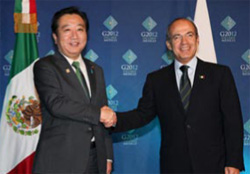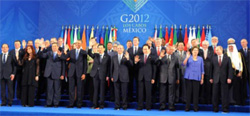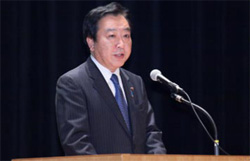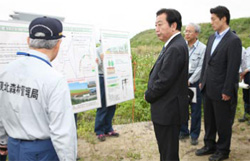Home > Highlighting JAPAN > Highlighting Japan AUGUST 2012 > G20/The World Ministerial Conference on Disaster Reduction in Tohoku
Highlighting JAPAN
PRIME MINISTER'S DIARY
G20

Prime Minister Yoshihiko Noda with the President of Mexico Felipe Calderon Hinojosa at the venue of the G20 Summit
At the Summit Meeting, the Leaders held active discussions mainly on global economic issues, including measures needed to address the European debt crisis that has been destabilizing the global financial markets.
As Japan's efforts, Prime Minister Noda cited such undertakings as the purchase of bonds issued by the European Financial Stability Facility (EFSF) and the commitment to contribute 60 billion dollars for a new line of credit to strengthen the IMF resources. Referring to nations which have not yet announced amounts of their contributions to strengthen the IMF resources, he urged them to announce the amounts to reassure markets. He also explained Japan's efforts to prevent spillovers of the European crisis into Asia, including its efforts to enhance the Chiang Mai Initiative.

The G20 leaders attend a photo session
Moreover, Prime Minister Noda stated on the first day of the Summit that the development of developing countries is necessary and that from this point of view, development issues such as inclusive green growth and infrastructure should be considered as G20 agenda in order to achieve sustainable and balanced growth. He also noted that Japan would contribute to this cause through its Vision and Actions toward Low-Carbon Growth and a Climate-Resilient World, the assistance to the strengthening of ASEAN's connectivity, and knowledge on disaster management, among other things. Moreover, he added that Japan would provide 1 billion dollars worth of yen credits through the EPSA (Enhanced Private Sector Assistance for Africa) framework in five years, and that Japan would also discuss economic growth through private-sector investment during TICAD V to be held next year.
Based upon the discussions at the Summit Meeting, the "G20 Leaders Declaration" and the "Los Cabos Growth and Jobs Action Plan" were issued
The World Ministerial Conference
on Disaster Reduction in Tohoku

Prime Minister Noda delivers an address at the opening ceremony of the World Ministerial Conference on Disaster Reduction in Tohoku, Japan.
Every year, about 200 million people are affected by natural disasters and citizens of developing countries account for 90% of the victims. Economic losses of natural disasters on average exceed 100 billion dollars per year. Against this backdrop, the international community reaffirmed the significance of efforts for disaster reduction; it expressed its political commitment to mainstreaming disaster reduction and building resilient societies. The Hyogo Framework for Action, which serves as international guidelines for disaster reduction, and the Millennium Development Goals (MDGs), which serve as the international navigation compass in development, will both come to the end of their terms in year 2015. The direction of future disaster reduction in the international community was crystallized as incorporating disaster reduction in post-2015 development framework and establishing an effective post-Hyogo Framework for Action. Japan expressed its determination to lead international efforts for disaster reduction.

Prime Minister Noda observes the site of the project to restore disaster-prevention forests along the Tohoku coast, Japan
"More than a year has passed since the Great East Japan Earthquake on March 11 of last year. Time will, however, never weaken our gratitude for the warm support and encouragement we received from the international community. On behalf of the people of Japan, I would like to thank you once again."
"In order to facilitate the construction of resilient societies across the world, Japan will contribute three billion dollars in assistance for three years starting in 2013. Japan would like to be a host to the third United Nations World Conference on Disaster Reduction in 2015, utilizing the outcome of this Conference in Tohoku, as part of our continued contributions toward establishing a new international framework for disaster reduction."
© 2009 Cabinet Office, Government of Japan






